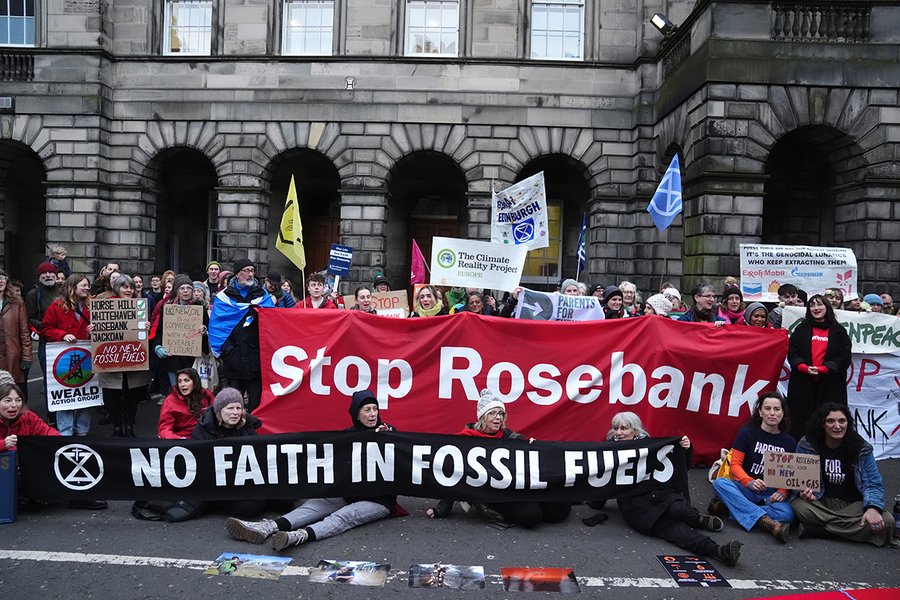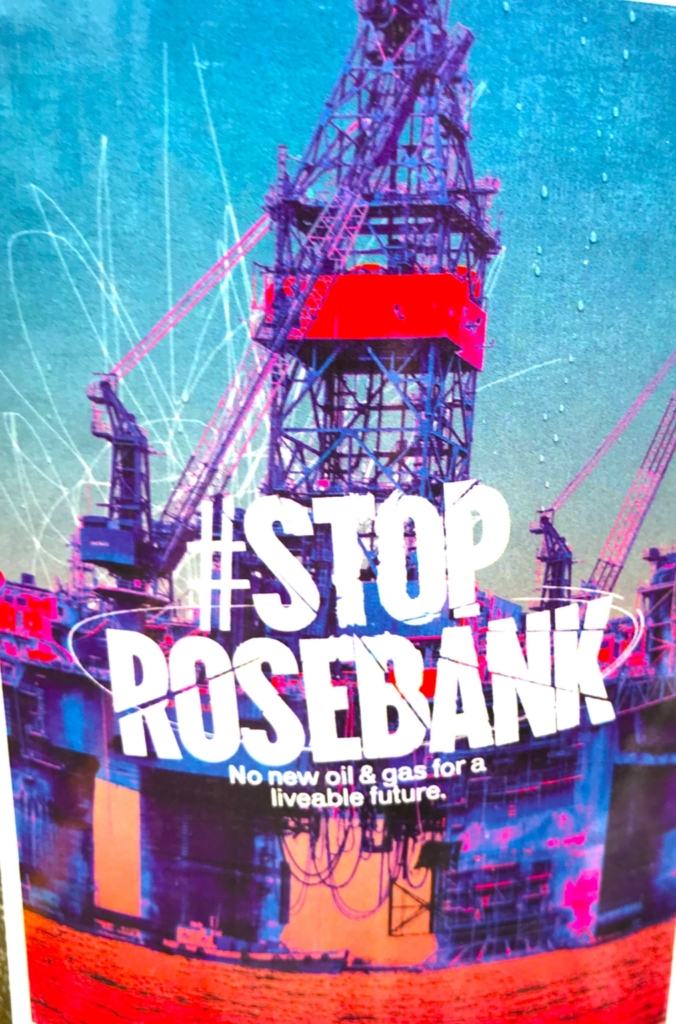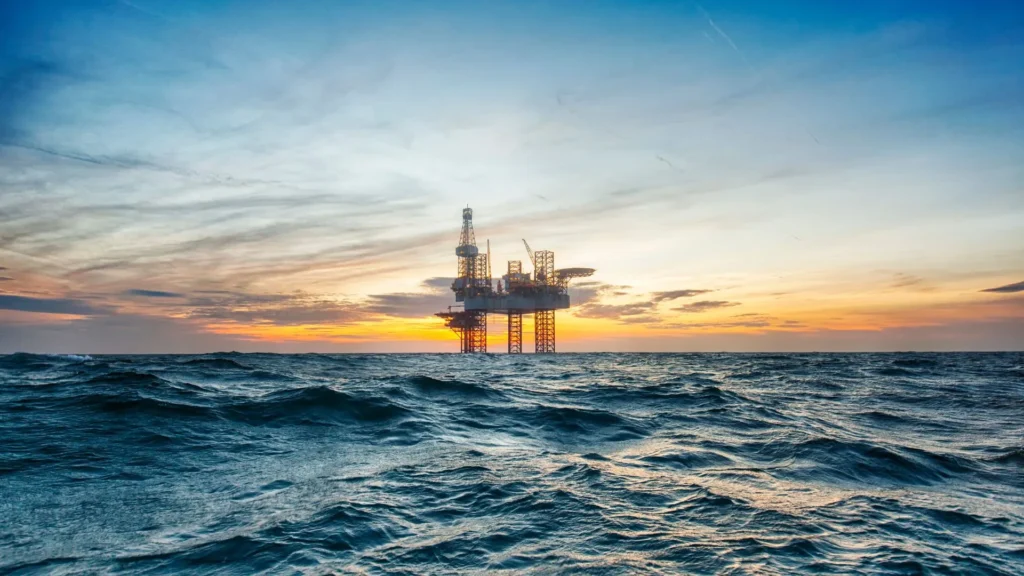Equinor and Ithaca’s massive gamble on Rosebank fails
The decision to approve a giant new oilfield off Scotland has been ruled unlawful by the courts – an outcome that campaigners have hailed as an incredible victory for the planet. In 2023, the previous Conservative government green-lit the Rosebank development, approving drilling in the UK’s biggest untapped oilfield.
The field – located off the Shetland Islands – contains 500 million barrels of oil and could produce 200 million tonnes of CO2. Climate campaigners were sickened by the approval. But on 30 January, they enjoyed a historic victory: the Court of Session in Edinburgh ruled that consent for the Rosebank and Jackdaw North Sea oil and gas fields was granted unlawfully, because regulators failed to consider the climate impact of burning oil and gas. Sandy Winterbottom reports for Bella…
Last November at the Court of Session in Edinburgh, I sat in on the first morning of the case brought by Greenpeace and Uplift, challenging the legality of the consent granted in September 2023 by the previous UK Government, to develop the Rosebank oilfield.
The neat Greenpeace lawyer spoke so quietly, and with such gravitas, that it felt like a collective holding of breath in the camped benches behind her. Seven lawyers on the front row, eight on the second, and four full rows behind, all with identical laptops, balanced on identical knees jammed into benches designed for leaner times.
The cost of the trial must have been enormous, but then so are the sums of money at stake. Owners Equinor and Ithaca already have the deep pockets required for a project like Rosebank. Greenpeace and Uplift on the other hand, are funded by charitable donation from members of the public. They had good grounds for optimism though. The case came hot on the heels of a win in the Supreme Court in June 2024, against Surrey County Council’s decision to grant planning permission for oil drilling at Horse Hill in Surrey.
Sarah Finch, representing the Weald Action Group, had successfully argued that the Environmental Impact Assessment (EIA) for the project should have considered the climate impacts from burning the oil extracted – the Scope 3 emissions. It’s been likened to doing a health risk assessment on a packet of cigarettes without taking into account that they would be smoked.


The Finch ruling had far-reaching implications for new fossil fuel projects throughout the UK and the North Sea, including the controversial Rosebank project, which had failed to include Scope 3 emissions in its EIA. By the time the Rosebank case was heard in the Scottish Courts, the Secretary of State, the North Sea Transition Authority in charge of regulating the North Sea, and owners Equinor and Ithaca, had all accepted that the approval was unlawful. The court case was about what would happened next.
The lawyer for Greenpeace asked for a reduction of consent, meaning that the permission would be deemed invalid. “It would not preclude the interested parties from carrying out the necessary safety works,” she assured the judge. The sea of laptop screens from the benches in front of me scrolled with identical paragraphs highlighted in identical green and orange.


Equinor argued they’d already spent around £466m getting the project to consent and had already committed a further £1.87 billion in ongoing contracts. Any such decision would severely prejudice them, they pleaded.
“That is the nature of commercial risk-taking, and must be subject to the rule of law,” countered the Greenpeace lawyer.
Equinor and Ithaca disputed that they’d taken a gamble on the oil field, claiming that they’d relied instead on what appeared to be a supportive, stable and predictable UK Government – this at a time when Prime Ministers had a shorter shelf-life than the contents of a salad drawer. These companies know all about risk taking. It is the job of business, on behalf of its shareholders, to assess, manage and make decisions based on risk as regulations, governments and public opinions shift – there are complex spreadsheets dedicated to it. Six months previous to the consent being granted, Equinor took a huge risk by doubling its shares in the oilfield, to 80%. The £709 million deal was made at a time when other developers were pulling out of the North Sea. Once consent was in place for Rosebank though, Equinor’s investment had soared to an estimated value of £2.4 billion. A back-of-the-envelope calculation suggests the approval alone, earned the developers – on paper at least – around £4.3 billion with the stroke of a pen. Big risk can bring big rewards.
Well organised campaigners rallied against the oilfield. Equinor didn’t waste much time in trying to offload some of its shares in Rosebank. The trouble was, by then, nobody was buying their bluster: Greenpeace and Uplift had already warned that the consent was unlawful.
The November court case lasted four days in total. In his final judgement released on the 30th January, Court of Session judge Lord Ericht overturned the Rosebank consent, reasoning that the “public interest in authorities acting lawfully and the private interest of members of the public in climate change outweigh the private interest of the developers”. Lord Ericht added though, that work on the oilfield could continue while new information was gathered, but no oil and gas could be extracted unless fresh approval was granted. The choice to proceed with the project, he added, would be a commercial decision for the developers taking into account the risks involved, including the risk as to whether or not the consents will be granted. Equinor and Ithaca made light of the decision, stating in their press releases that it would allow them to progress the project while awaiting new consent.


The outcome of the court case is huge win for climate campaigners – it’s already the third big win in Scotland this year. On the 6th January, Dundee City Council joined Edinburgh and Glasgow, by unanimously voting to back the call for a Fossil Fuel Non-Proliferation Treaty, demanding a fast, fair and funded transition away from fossil fuels. On the 15th January, Energy giant SSE were forced by climate groups, MSPs and members of the public to reassess the harm of a controversial new gas-fired power station in planning for Peterhead, after failing to properly calculate the full scale of the climate pollution. Their proposals to burn gas for a further 35 years, whilst using dubious and unproven carbon capture technology are now under serious scrutiny.
In 2019, the head of the Organisation of Petroleum Exporting Counties (OPEC), Mohammed Barkindo, described the mass mobilisation of world opinion against oil, as the greatest risk the industry faces. He warned that the surge in opposition against oil was beginning to dictate policies and corporate decisions. Fossil fuel companies know the risks – they’ve known the risks since 1965.
Public opposition and relentless campaigning against the Rosebank Oilfield, has succeeded in passing the decision back to the UK Government, who again under public pressure, have already promised us no new exploration licences. Will they choose to enrich the Norwegian state-owned Equinor and its partner in the project, Israeli-owned Ithaca Energy whose parent company is UN blacklisted, or will they side with the majority of people in the UK that are becoming increasingly alarmed by the volatility of global energy markets, the human and financial impacts of extreme weather events, and the stark consequences of a rapidly changing climate? I know who my money is on.

… and now we hear that the Treasury and the UK Labour cabinet led by Starmer are keen to approve the oilfield ?
Echoes of CAAT winning the argument against arms exports to Saudi Arabia only to have the UK Govt simply assert they had undertaken further due diligence and re-issue approval for those weapons exports to a state which was daily bombing Yemeni civilians as their contribution to a civil war.
I’m sorry to say that this is a foregone conclusion. Much as it makes me unhappy, Big Oil must be placated and our Wesminster government will jump through whatever hoops are necessary to allow these projects to go ahead.
Thank you Sandy for this very insightful article. Despite some of the forure in the media, public opinion against oil and gas extraction continues to grow, not least because we in the UK are starting to experience the impacts of climate change. On the day following Equinor’s annual profits announcement, which despite being huge ( £24 bn) were lower than previous years, I wonder when they will realise that they are in fact backing the wrong horse. It seems likely that their investment in Rosebank has already cost them dearly, impacting their profits. Their response has been to double down on fossil fuel investment at the expense of renewables. The science, people power, and our lived reality of experiencing the climate unravelling before our eyes, is going to drive the transition to renewables. If I was a shareholder in Equinor, I would be moving my money.